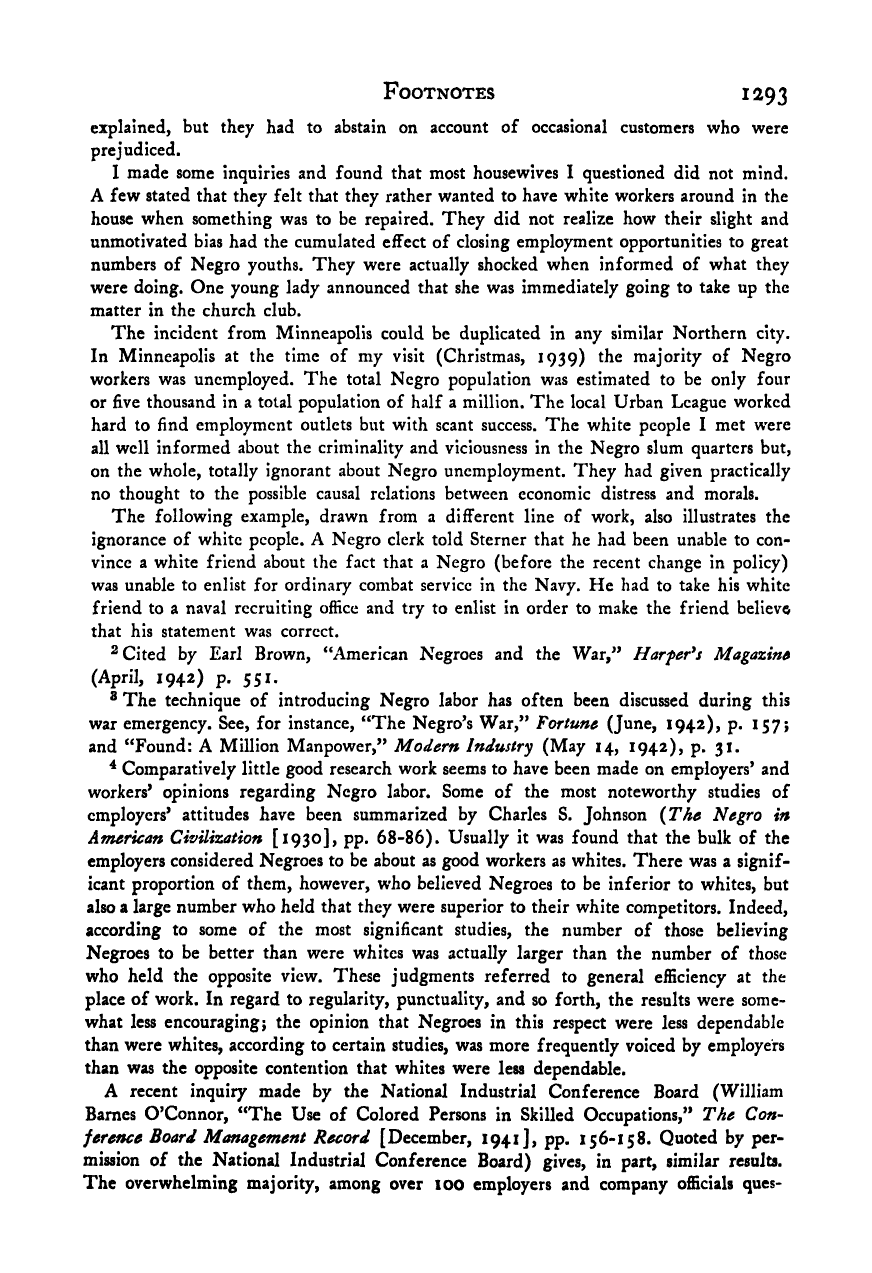Note: Gunnar Myrdal died in 1987, less than 70 years ago. Therefore, this work is protected by copyright, restricting your legal rights to reproduce it. However, you are welcome to view it on screen, as you do now. Read more about copyright.
Full resolution (TIFF) - On this page / på denna sida - Footnotes - Chapter 17

<< prev. page << föreg. sida << >> nästa sida >> next page >>
Below is the raw OCR text
from the above scanned image.
Do you see an error? Proofread the page now!
Här nedan syns maskintolkade texten från faksimilbilden ovan.
Ser du något fel? Korrekturläs sidan nu!
This page has never been proofread. / Denna sida har aldrig korrekturlästs.
Footnotes 1293
explained, but they had to abstain on account of occasional customers who were
prejudiced.
I made some inquiries and found that most housewives 1 questioned did not mind.
A few stated that they felt tlut they rather wanted to have white workers around in the
house when something was to be repaired. They did not realize how their slight and
unmotivated bias had the cumulated effect of closing employment opportunities to great
numbers of Negro youths. They were actually shocked when informed of what they
were doing. One young lady announced that she was immediately going to take up the
matter in the church club.
The incident from Minneapolis could be duplicated in any similar Northern city.
In Minneapolis at the time of my visit (Christmas, 1939) the majority of Negro
workers was unemployed. The total Negro population was estimated to be only four
or five thousand in a total population of half a million. The local Urban League worked
hard to find employment outlets but with scant success. The white people I met were
all well informed about the criminality and viciousness in the Negro slum quarters but,
on the whole, totally ignorant about Negro unemployment. They had given practically
no thought to the possible causal relations between economic distress and morals.
The following example, drawn from a different line of work, also illustrates the
ignorance of white people. A Negro clerk told Sterner that he had been unable to con-
vince a white friend about the fact that a Negro (before the recent change in policy)
was unable to enlist for ordinary combat service in the Navy. He had to take his white
friend to a naval recruiting oflke and try to enlist in order to make the friend believo
that his statement was correct.
^ Cited by Earl Brown, ‘‘American Negroes and the War/’ Harfer^s Magazind
(April, 1942) p. SS»-
® The technique of introducing Negro labor has often been discussed during this
war emergency. See, for instance, “The Negro’s War,” Fortune (June, 1942), p. 157;
and “Found: A Million Manpower,” Modern Industry (May 14, 1942), p. 31.
^ Comparatively little good research work seems to have been made on employers’ and
workers’ opinions regarding Negro labor. Some of the most noteworthy studies of
employers’ attitudes have been summarized by Charles S. Johnson {The Negro in
American Civilization [1930], pp. 68-86). Usually it was found that the bulk of the
employers considered Negroes to be about as good workers as whites. There was a signif-
icant proportion of them, however, who believed Negroes to be inferior to whites, but
also a large number who held that they were superior to their white competitors. Indeed,
according to some of the most significant studies, the number of those believing
Negroes to be better than were whites was actually larger than the number of those
who held the opposite view. These judgments referred to general efficiency at the
place of work. In regard to regularity, punctuality, and so forth, the results were some-
what less encouraging; the opinion that Negroes in this respect were less dependable
than were whites, according to certain studies, was more frequently voiced by employers
than was the opposite contention that whites were less dependable.
A recent inquiry made by the National Industrial Conference Board (William
Barnes O’Connor, “The Use of Colored Persons in Skilled Occupations,” The Con-
ference Board Management Record [December, 1941], pp. 156-158. Quoted by per-
mission of the National Industrial Conference Board) gives, in part, similar results.
The overwhelming majority, among over lOO employers and company officials ques-
<< prev. page << föreg. sida << >> nästa sida >> next page >>